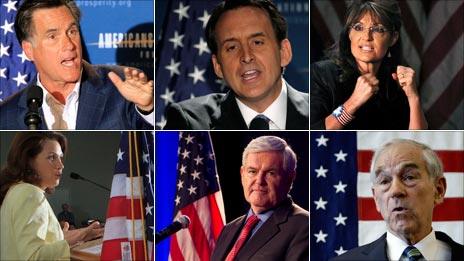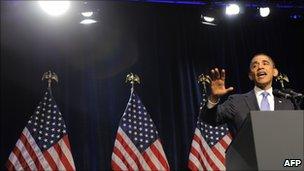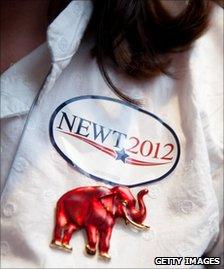Are Republicans reluctant to take on Obama?
- Published

With two more Republicans dropping out of the 2012 presidential race, and others still holding back, the field of candidates to take on President Barack Obama has yet to take shape. Why?
Within a little over a year-and-a-half, the United States could have a new president.
Unlike in many European countries, where an election 18 months away may not register, US campaigns are drawn out by presidential candidates fighting primary contests first.
Usually by this stage, and especially in recent years, the race for the White House would have a wider field of candidates, campaigning and raising funds before the primaries begin early in election year.
Only a few credible candidates have formally declared their intention to run in 2012, while others like Mitt Romney are exploring the option and almost certain to run, without yet officially joining the race.
Some believe it's the slowest start for nearly 20 years, when a relatively unknown governor from Arkansas, Bill Clinton, emerged from the pack to unseat President George HW Bush.
This week, another former governor of the Natural State, Mike Huckabee, ruled himself out of the running for the Republican nomination, despite being considered to be one of the frontrunners.
Two days later, business mogul Donald Trump said he also would not run, joining a rather crowded field of GOP (Grand Old Party, as the Republican Party is known) figures who have said the same.
So is the fact people are dropping out, and others holding back, an indication they are running scared?
Not really, says Shaun Bowler, a professor of political science at the University of California at Riverside. It's not unusual to see people change their minds about running.
"We often see candidates dip their toe in the water - then pull it back out again. The commitment to run for president is a huge one and so it isn't surprising that some people have second thoughts, and some people are still on the sidelines thinking it through."
But this period seems a little more in flux than usual because it's uncertain how vulnerable Mr Obama is, he says, and the Republican Party remains quite divided. Both these factors make it hard for people to decide whether to run or get out.
"The big uncertainty remains the economy. It just isn't clear whether it will recover enough jobs or not. If jobs are created, Obama wins; if they are not, he is vulnerable. Right now it isn't clear what it will be like."
The second reason for Republicans' hesitation is found within their party, says Prof Bowler.
"The split between social and fiscal conservatives seems to have died down since 2008 but the Tea Party wing is now out there on the right. The background problem is that the GOP has a problem with minority voters and minorities are an ever-growing share of the electorate.
"The GOP vote base is older, whiter and to some extent more Protestant than the demographic trends. There does not seem to be a candidate - yet - who can navigate those different currents. The GOP needs a new Reagan and it isn't clear that they have what they need this time."
There is also the advantage Mr Obama gains simply from being the incumbent. Only three sitting presidents have lost an election since World War II - Gerald Ford, Jimmy Carter and George HW Bush.
A president has name recognition, a war chest of money and can sit back and watch while the other party's candidates fight tooth and nail with each other to get the nod.
The two-term limit means Mr Obama will have to step down in 2016 if he wins re-election next year.

The man to beat
That means some of the Republicans may be biding their time, says Steve Mitchell of political polling company Mitchell Research. But he thinks a good Republican candidate could yet emerge and capitalise on the disquiet people are feeling about the economy.
"You would always bet a president will be re-elected but the longer this anger goes on and if unemployment is still up at 7-8% and gas prices are above four dollars a gallon in a year from now, then Obama has a very difficult task."
Scott Reed, who managed Bob Dole's 1996 campaign, says the delayed start is due to Republican House Speaker John Boehner and Congressman Paul Ryan's budget driving the news agenda. He is upbeat about Republican prospects.
"I'd dispute it's a weak field because it's a good process and the best candidate does win out. Someone has to stand up on the stage in the fall of 2012 and take it to Obama on his policies, issues and ideas. Everyone likes him as a person but his ideas are wrong."
Cash carrot
What's different this time is people feel there's more to lose by entering the race early than there is to be gained, says John Avlon, author of Wingnuts: How the Lunatic Fringe is Hijacking America.
All the polling suggested Mike Huckabee had a good shot at the nomination, he says, but he gave it up so he could continue his lucrative contract with Fox News.
"He's not a wealthy man. For the first time in his life he's making real money, so there's a clear disincentive for running, as well as the thought, 'Do I really want to run the gauntlet?'
"He stands to make more money and be a kingmaker in his party if he stays out, and keeps his reputation intact."
Attacks come from outside and within the party, a phenomenon that has strengthened in recent years, he says. The internet has compounded the way the moderate voices in both parties are shouted down by those on the extremes.

Gingrich is a popular figure
"These factions exist on the fringes of both parties. It's not that they occupy a larger part than before but they are a louder lobbying bloc.
"The internet has elevated this dynamic and helped them to organise across state lines, enabling them to impact on the political debate. That's an interesting new factor."
The primary contests pander to the extremes of the party, says Mr Avlon, who is also a columnist for the Daily Beast. But the successful candidate has to return to the centre ground to get to the White House because he or she has to appeal to more moderate voters.
It's a political dance, says Mr Avlon, but it means that should a moderate Republican like Mitch Daniels or Jon Huntsman get through the primaries, they have the ability to appeal to the independent voters who decide the outcome of elections.
But first they have to enter the race.
- Published16 May 2011
- Published15 May 2011
- Published3 January 2012